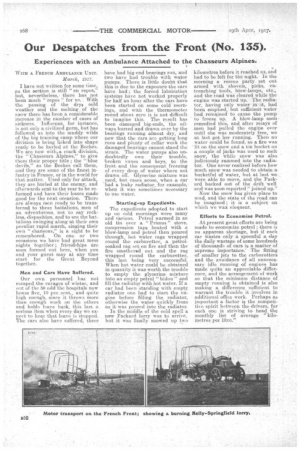Our Despatches from the Front (No. 155).
Page 18

If you've noticed an error in this article please click here to report it so we can fix it.
Experiences with an Arnbulance Attached to the Chasseurs Alpines.
WITH A FRENCH AMBULANCE UNIT.
March, 1917.
I have not written for some time, as the section is still " en repos," but, nevertheless,' there has pot been much " ropes" for-us. With the passing of the dry, cold weather and the melting of the snow there has been a considerable inerease in the number of .cases of sickness. Influenza, for instance, is not only a civilized germ, -but has followed us into the muddy wilds of the big training camp where our division is being licked into shape ready to be hurled at the Boches. We are now with, a crack division, the " Chas.seurs Alpines," to give them their proper title ; the "blue devils," as the Boches call them, and they are some of the finest infantry in France, or in the world for that matter. Used only for attack, they are hurled at the enemy, and afterwards sent to the rear to be reformed and have their losses made good for the next occasion. There are always men ready to be transferred to these battalions, men of an adventurous, not to say reckless, disposition, and to-see the battalions swinging along at their own peculiar rapid march, singing their own "chansons," is a sight to be remembered. On one or two occasions we have had great mess nights together ; friendships are soon formed out here, when you and your guest may at any time start for the Great Beyond together.
Men and Cars Have Suffered.
• Our own personnel has not escaped the ravages of winter, and out of the 50 odd the hospitals now house five, 10 per_ cent., and quite high enough, since it throws More than enough work on the others and holds leave back, this last a serious item when everyday we expect to hear that leave is stopped. The cars also have suffered, three
have had big-end bearings run, and two have had trouble with water pumps. There is little doubt that this is due to the exposure the cars have had ; the forced lubrication. systems have not Worked properly for half an hour after the cars have been started on some cold mornings, and with the thermometer rolind, about zero it is not difficult to imagine this. The. result has been damaged big-ends, the oilways burred and drawn over by the bearings running almost dry, and now that the ears are getting long runs and plenty of collar work the damaged bearings cannot stand the strain. The water pumps also undoubtedly owe their trouble, broken vanes and keys, to the fret and the consequent freezing of every drop. of water where not drawn off. Glycerine mixture was used, but cases arose, when a ear had a leaky radiator, for example,• when it was sometimes necessary to use water.
Starting-up Expedients.
The expedients adopted to start up on cold mornings were many and Various. Petrol :warmed in an old tin over a " Primus " stove, compression taps heated with a blow-lamp and petrol then poured through, hot water rags wrapped round the carburetter, a petrolsoaked rag set on fire and then the fire smetherad out and the rag wrapped round the carburetter, this last being very successful. When hot water could be. obtained in quantity it was worth the trouble to empty the glycerine mixture into an empty petrol " bidon " and fill-the radiator with hot water. If a car .had been standing with empty radiator one had to start the engine before filling the radiator, otherwise the water quickly froze as it was pouned into the radiator.
In the middle of the cold spell a -maw Packard lorry was to arrive, but it was finally snoWed up two kilometres before it reached us, and had to be left for the night. In the morning a rescue party set out armed with shovels, picks, entrenching tools, blow-lamps, etc., and the road was cleared while the engine was started up. The radiator, having only water -in-sit, had been emptied, but sufficient water had remained to cause the pump to freeze up. A blow-lamp soon remedied this, and after relays of men had pulled the; engine over until she was moderately free, we at last got her running. Then no water could be found, so a fire was lit on the snow and a tin bucket on a couple of jacks was used to melt snow, the while snow was also judiciously rammed into the radiator. One never realized before how much snow was needed to obtain a bucketful of water, but at last we were able to move, and the Packard backed out of the drift well and was Soon reported " joined up."
Now the snow has given place to mud, and the state of the road can be imagined ; it is a subject on which we wax eloquent.
Efforts to Economise Petrol.
At present great efforts are being made to economize petrol ; there is no apparent shortage, but if each car wastes only a spoonful a day the daily wastage of some hundreds of thousands of cars is a matter of supreme importance: The fitting of smaller jets to the carburetters and the avoidance of all unnecessary idle. running of engines has made quite an appreciable difference. and the arrangement of work so that the minimum distance of empty running is obtained is also making a difference sufficient to warrant the trouble it involves in additional office work. Perhaps as important a factor is the competitive spirit between the drivers, for each one is striving to head the monthly list of average " kilometres per litre."






















